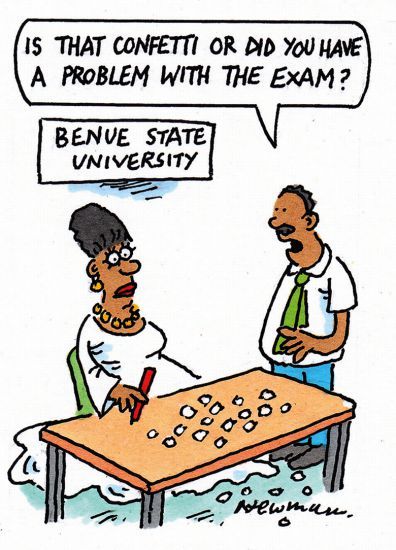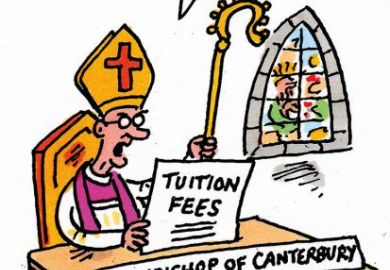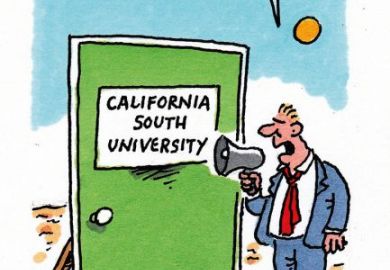
Student campaigners at the University of Oxford who have been calling for the toppling of a statue of the Victorian imperialist Cecil Rhodes probably didn’t imagine that they might get another figure of him as a result of their protests. But creating a replica of the controversial statue at Oriel College is one of the suggestions being put forward by a university working group that is considering ways for Oxford to visibly confront its colonial past, The Sunday Times reported on 15 April. A crucial difference with the replica would be that students would be allowed to deface it with graffiti including swear words. Whether the replica would survive long enough to attract messages is unclear, however, as campaigners might be tempted to ceremonially destroy it to show what they’d like to do to the real thing.
Creationists and evolutionists can finally hang up their swords – life was brought to Earth by comets carrying frozen octopus eggs, a new paper claims. “Cause of the Cambrian Explosion – Terrestrial or Cosmic?”, published in Elsevier’s Progress in Biophysics and Molecular Biology, argues that viral genes and frozen eggs of complete species such as octopuses arrived here during the Big Bang. The international study, authored by no fewer than 33 scientists, challenges previous conceptions that the evolution of life was wholly terrestrial and suggests that our “evolutionary legacy” will one day “return to space”. Journal editor Denis Noble defended the paper as “empirical and testable”. “There really is no agreed theory on how life arose on Earth. We simply don’t know,” he told The Australian on 14 April. The revelations have received a mixed reception from reviewers, however. Karin Moelling, an evolution scientist at the Max Planck Institute, said that the “main statement about viruses, microbes and even animals coming to us from space cannot be taken seriously”.
If there were a global prize for student dedication, Dorcas Atsea and Deborah Atoh might well take it. The two women, both studying mass communications at Nigeria’s Benue State University, faced the same predicament when their final exam was rescheduled – to the day on which both had arranged to get married. When neither the weddings nor the examination date could be rearranged, the women chose to give both life-changing events equal priority. Both brides said their vows in the morning, sat their exams at midday then returned to their wedding receptions in the afternoon, the BBC reported on 11 April. A photograph of the two women sitting their exams in bridal gowns went viral on social media, and Twitter users praised their scholarly ethic and “positive statements” made.
The Daily Mail may have shown a surprisingly soft side in its support of the Open University last week, but it was soon back to form with a double-page spread attacking “left-wing nastiness” on 12 April. Alongside columnist Stephen Glover’s whine about universities creating a “Left-wing fifth column” tearing apart society, University of Cambridge literature scholar Priyamvada Gopal was made an example of because her Twitter use marked her out as a “prolific internet troll”. Dr Gopal, a senior lecturer at Churchill College, Cambridge, condemned the article – headlined “How CAN Cambridge let this hate-filled don pour out her racist bile”? – as a “racist and sexist hatchet job”, Varsity reported. “I am sorry but not surprised to see that the Daily Mail is hypocritical on the matter of freedom of expression,” she said. “A woman of colour who has strong anti-racist and anti-colonialist views must be shut down.”
A University of Wolverhampton academic interviewed for a controversial BBC radio broadcast to mark the 50th anniversary of Enoch Powell’s “rivers of blood” speech was edited out of the final transmission after she complained about the way the programme was promoted. Shirin Hirsch, a postdoctoral research fellow at the institution, said that she was “disgusted” by how the BBC had trailed the Radio 4 show, which was billed as the first time that the speech, read by actor Ian McDiarmid, had ever been transmitted in full (although it was broken up by analysis and comment). “I made a mistake and was interviewed for this, but I have been sick with worry since seeing the way this is being presented,” Dr Hirsch posted on Twitter, The Guardian reported. Initially she complained that producers were not responding to requests to pull her quotes from the programme. But a day before the broadcast on 14 April, Dr Hirsch said that the BBC had agreed not to use her contribution.
Register to continue
Why register?
- Registration is free and only takes a moment
- Once registered, you can read 3 articles a month
- Sign up for our newsletter
Subscribe
Or subscribe for unlimited access to:
- Unlimited access to news, views, insights & reviews
- Digital editions
- Digital access to THE’s university and college rankings analysis
Already registered or a current subscriber?



